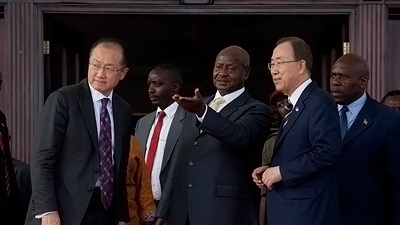As Africa grapples with persistent drought affecting millions in the Sahel and flooding that endangers lives and livelihoods in Mozambique, the role of disaster resilience in the continent’s promising development future is increasingly clear.
Those risks and securing Africa’s development future brought UN Secretary-General Ban Ki-moon and World Bank Group President Jim Yong Kim together with African leaders and Japanese Prime Minister Shinzo Abe this past weekend to mobilize support behind Africa’s development and to mobilize an international consensus to integrate disaster and climate risk considerations in development policy and programs.
“Africa is the engine of growth of the future,” Kim said at the Tokyo International Conference on African Development (TICAD V) in Yokohama, Japan. “But with its population growth, rapid urbanization, and environmental pressures it is also extremely vulnerable to the impacts of disasters and climate change."
“Future-proofing African development by building resilience will determine how successful we are at ending extreme poverty and creating shared prosperity,” Kim said.
Developing countries have suffered an estimated $1.2 trillion in disaster damage and loss over the past 30 years. That is about three times the gross domestic product (GDP) of South Africa, and the numbers do not include the cumulative impact of the smaller events that affect communities on a recurring basis.
These recurring events, such as flooding and heat waves, may not make international headlines the way the worst drought in 60 years in the Sahel has, but when they hit over and over again, they push vulnerable people deeper into poverty – with impacts that roll back years of development gains.
The good news is that the donor community and governments are shifting gears toward more prevention and resilience. Instead of simply reacting to disasters, resilience is being integrated into all aspects of development.
The consequences of global temperatures rising, coupled with dramatic increases in the number of people exposed to disasters and climate extremes, is tipping the balance toward resilience. If development programs don’t proactively factor in risk up front, African countries and their development donors may not be to weather the rising costs of disasters.


